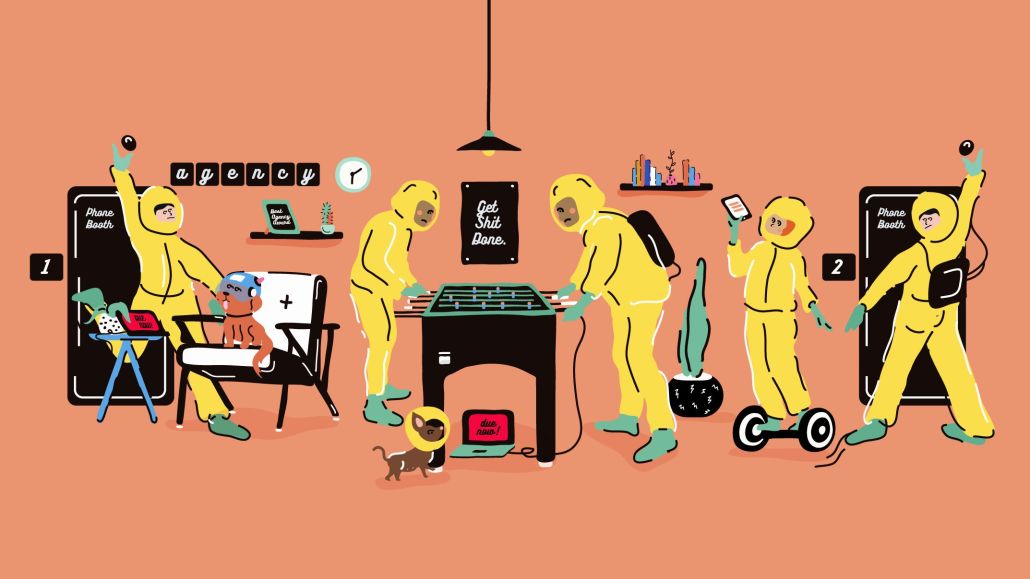Save 50% on a 3-month Digiday+ membership. Ends Dec 5.
This Gen Z agency ‘eliminates the learning curve’ to connect brands with its generation

What started as two college students helping startups understand branding has morphed into a full-blown digital advertising agency with Gen Zers at the helm.
Since launching four years ago, CarsonDoyle has grown to become an agency that toes the line between creative and advertising, snapping up work with clients like direct-to-consumer brand Backcountry Access, active water bottle company Modl Outdoors and even the dating app Tinder.
CarsonDoyle, based out of Denver and London, is made up of eight full-time Gen Zers: all digital natives under 25 years old. CarsonDoyle’s pitch to brands is that it can connect them to younger audiences simply because they are the youngest generation brands are seeking, said creative director Thomas Brazier.
During the pandemic, agencies and brands pivoted, doubling down on their digital media and marketing efforts to keep up with consumers’ changing online shopping habits. Platforms like TikTok, where there’s a heavy Gen Z presence, rose in popularity and marketers sought to add it to their strategies.
But at CarsonDoyle, the internal infrastructure was already there, giving them an edge over the competitor and ultimately winning the agency work with Tinder. “We were able to sink our teeth into it,” said managing director Charlie Naus. “We learned what we were pretty good at and in that, driving that authenticity and cultural understanding.”
“It almost eliminates the learning curve,” Brazier said, of being part of the Gen Z target that many marketers are aiming to capture. “We’ve saved [brands] a lot of time and energy and focus of trying to figure it out. It’s like no, we have it figured out.”
Currently, the agency focuses on digital, paid media, creative and of course, offering first-hand research and insights. One day, they hope to the next Wieden+Kennedy with an in-house accounts team, planners and media buyers.
Ad position: web_incontent_pos1
The agency is positioning itself to bridge the gap between traditional, legacy brands and Gen Z, advocating for younger consumers who they say feel taken advantage of and untrusting of brand authenticity, per Brazier.
Surveys and Google searches can only provide so much insight into Gen Z, Brazier said. But as Gen Zers, the CarsonDoyle staff has access to the daily life of a Gen Zer, participating in the peer to peer text conversations and ever-changing TikTok trends, marrying insight and consultancy for brands hoping to connect to Gen Z.
“We’re trying to change the tone. How can we be an advocate for [younger consumers] as opposed to try to sell them something that might screw them over,” Brazier said.
Recently, CarsonDoyle caught the attention of the U.S.’s most popular dating app Tinder. Last September, the team led Tinder’s paid media creative, supported brand campaigns and worked with the dating app to lead the production of its National Snap Lens, which launched earlier this year.
Most notably, the Gen Z agency supported Tinder in their viral “Put Yourself Out There” campaign featuring rapper Megan Thee Stallion. Work included supporting paid media creative to be delivered across digital and streaming platforms like Hulu, Roku and Twitch.
Ad position: web_incontent_pos2
“That was a very gratifying feeling just knowing that some new guns to this industry could still take on a client and convince them of trying something new or going with the younger approach might be best,” Brazier said.
It’s no secret that the advertising industry has been scrambling to connect with Gen Z, tomorrow’s consumers. Brands like Chobani are using TikTok to reach younger audiences. Others are focusing on commerce to stay relevant with those consumers.
“These kids are pretty authentic in the sense that they want to connect with people, content and brands that share their value,” said Frank Simonetti, CEO of Gen Z online community Sweety High. “And they want to be entertained.”
Sweety High dates back to 2011, where a team of over 20 people has studied upcoming generations, including Gen Z, to deliver relevant content. Sweety High has a heavy presence on TikTok with more than 10 million followers and manages a couple hundred million video views per month on their platform, Simonetti said.
Traditional brands sometimes struggle to be nimble enough to keep up with Gen Z’s changing sentiments, he said. It’s hard to stay in the zeitgeist for longer than a week or two and this is a generation that expects more of its brands.
“The rules of engagement have changed. Brands need to be proactive. They need to be transparent. It’s a pivot for them,” said Stacy Greco, vice president of brand strategy at Sweety High.
CarsonDoyle won’t be Gen Z-focused forever; the team has started to consider how that will evolve its business.
That means working more closely with college students to ensure they’re always abreast of emerging trends and “keep that bridge from us to the younger ones,” Naus said.
“We’re not doing anything crazy different from any other agency in terms of what we produce,” Naus said. “But what we are doing different[ly] is our practice of how we got there.”
More in Marketing

Ulta, Best Buy and Adidas dominate AI holiday shopping mentions
The brands that are seeing the biggest boost from this shift in consumer behavior are some of the biggest retailers.

U.K. retailer Boots leads brand efforts to invest in ad creative’s data layer
For media dollars to make an impact, brands need ad creative that actually hits. More CMOs are investing in pre- and post-flight measurement.
Ad position: web_bfu



